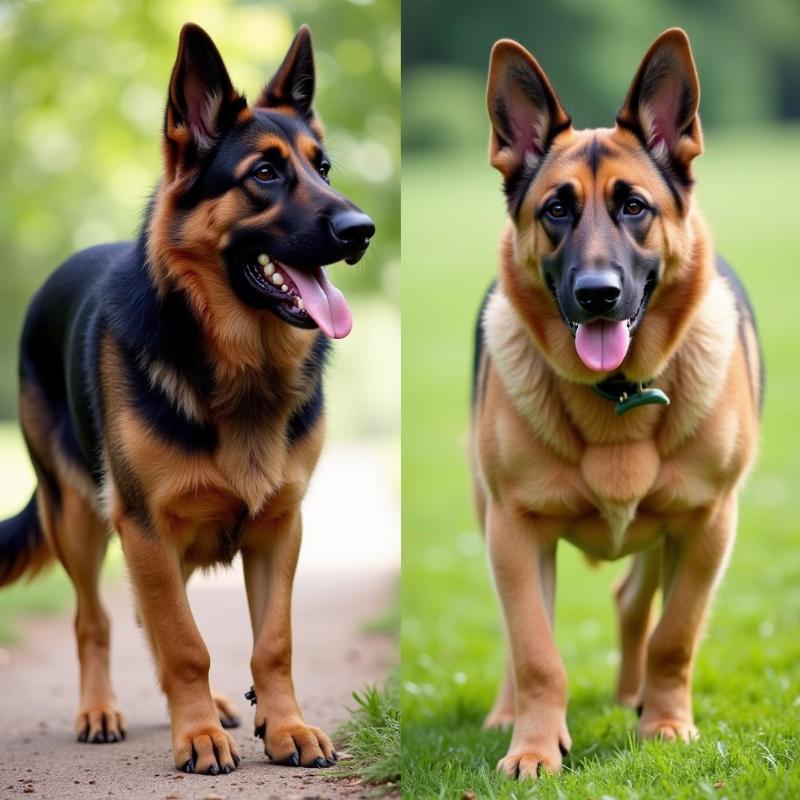The age-old question: are German Shepherds and Alsatian dogs the same breed? You’ll often hear these names used interchangeably, leaving many dog lovers wondering if there’s a hidden distinction. Let’s unravel this common query and delve into the history, characteristics, and nuances surrounding these magnificent dogs.
Decoding the Names: German Shepherd and Alsatian
The truth is, there is no real difference between a German Shepherd and an Alsatian dog. They are the same breed, simply with different names depending on the region and historical context. The breed originated in Germany in the late 19th century, bred for herding sheep. Their name, Deutscher Schäferhund, literally translates to “German Shepherd Dog.”
However, anti-German sentiment following World War I led to a name change in many English-speaking countries. The name “Alsatian Wolf Dog” was adopted, later shortened to “Alsatian.” This reflected the breed’s origins in the Alsace-Lorraine region bordering Germany and France.
 German Shepherd and Alsatian Comparison
German Shepherd and Alsatian Comparison
A Deep Dive into the Breed’s Characteristics
Whether you call them German Shepherds or Alsatians, these dogs share the same remarkable traits. They are known for their intelligence, loyalty, and courage. They excel in various roles, from police and military work to search and rescue and, of course, beloved family companions.
Key Traits of German Shepherds/Alsatians:
- Intelligence and Trainability: Highly intelligent and eager to please, making them exceptionally trainable.
- Loyalty and Protective Nature: Fiercely loyal to their families and naturally protective, making them excellent guard dogs.
- Athleticism and Energy: Energetic and athletic, requiring regular exercise and mental stimulation.
- Versatility and Adaptability: Adaptable to various climates and living situations, thriving in both urban and rural environments.
Temperament and Behavior: What to Expect
German Shepherds are generally confident, courageous, and sometimes reserved with strangers. Early socialization is crucial to ensure they develop into well-adjusted adults. They are known to form strong bonds with their families and can be incredibly gentle and affectionate with children.
Are German Shepherds Good with Other Pets?
With proper introduction and socialization, German Shepherds can coexist peacefully with other pets in the household. However, their herding instinct might lead them to nip at the heels of smaller animals, so supervision and training are essential.
Health Considerations: Breeding for a Healthy Future
Like many purebred dogs, German Shepherds are prone to certain health issues, including hip and elbow dysplasia, bloat, and degenerative myelopathy. Responsible breeders conduct health screenings to minimize these risks.
Finding Your Perfect Companion: Choosing a German Shepherd/Alsatian
If you’re considering adding a German Shepherd or Alsatian to your family, thorough research is essential. Finding a reputable breeder who prioritizes health and temperament is paramount.
What to look for in a breeder:
- Health testing: Ensures the parents are screened for genetic health issues.
- Temperament evaluation: Assesses the parents’ temperament to predict the puppies’ personalities.
- Early socialization: Exposes the puppies to various sights, sounds, and experiences.
Conclusion: Embracing the German Shepherd/Alsatian Legacy
Whether you call them German Shepherds or Alsatians, these remarkable dogs offer unwavering loyalty, intelligence, and an undeniable presence. By understanding their history, characteristics, and potential health concerns, you can make an informed decision and welcome a loving and devoted companion into your life. Remember to prioritize responsible breeding and early socialization to ensure a happy and healthy future for your furry friend.
FAQs:
- Are German Shepherds aggressive? Not inherently. Their protective nature can be perceived as aggression, but with proper socialization and training, they are typically gentle and loving.
- How much exercise does a German Shepherd need? They are an energetic breed requiring at least 60-90 minutes of daily exercise.
- Are German Shepherds good apartment dogs? While they can adapt to apartment living, they thrive in homes with yards and plenty of space to run and play.
- Do German Shepherds shed a lot? Yes, they are heavy shedders and require regular grooming.
- Are Alsatians bigger than German Shepherds? No, they are the same breed, so their size is generally the same.
- What is the average lifespan of a German Shepherd? 9-13 years.
- Are German Shepherds easy to train? Yes, their intelligence and eagerness to please make them highly trainable.
Find More Helpful Articles on Beautdogs.us (If Applicable – Place Links Here)
Beautdogs.us is your premier source for all things dog-related in the US. We offer expert advice on dog breeds, care, and products. Whether you’re a new dog owner or a seasoned expert, Beautdogs.us is your trusted resource for comprehensive and engaging information on canine companionship and care. Contact us today for all your dog-related needs! Email: [email protected], Phone: +1 501-555-7529. Visit Beautdogs.us for more valuable insights.